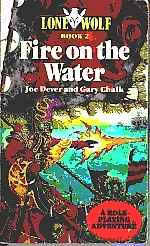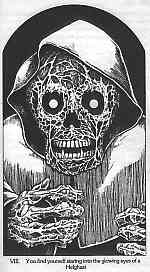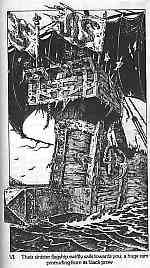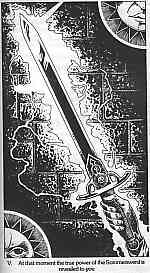
Main Page
 Main Page |
The Kai Monastery |
Those are the prophetic words of King Ulnar to Lone Wolf once the young initiate has reached the
King's court at the end of Flight From the Dark. They set
in motion a tremendous quest, the first of many for Lone Wolf. Alone, the last of the Kai must
travel hundreds of miles to the Durenese capital of Hammerdal and return with the Sommerswerd, a
magical weapon first given to the Sommlending by the great god Kai many centuries earlier, and
later bestowed upon the allies of Durenor as a sign of the trust and allegiance that exists between the
two kingdoms.
First printed in 1984, Fire on the Water has been reprinted many many times, including once
in 1984 and twice in 1986. Like Flight From the Dark, it
has received many facelifts as the publisher has changed over the years.
Fire on the Water tells the story of one of the most significant adventures in the Lone Wolf
saga: how Lone Wolf acquired the Sommerswerd. It continues the strengths of Flight From the Dark and develops the style of the Lone Wolf
books in the general direction that becomes standard in the later books.
The writing in Fire on the Water is overall superior to Flight
From the Dark. There is more attention payed to the characters Lone Wolf comes in
contact with, such as Lord-lieutenant Rhygar, and Captain Kelman. In general there are more
characters to interact with too. Later Lone Wolf books, especially 6, 8, 9, 11, 12, 15 and 18, all pay
similar attention to the roles of supporting characters, who are often an integral part of the story.
Fire on the Water continues developing the world of Magnamund in the same way the first
book does. We learn about Lakuri pirates, the rough and tumble city-state of Ragadorn, the
Helghast -- undead captains of the Darklords, the magnificent capital of Durenor and many other
wonders. Of course, this is a feature of all Lone Wolf books, but it is one of the strengths of the
series that such depth was envisioned so early on.
The book is much more linear than book one. There are only a few places where the reader can alter
the basic storyline: in Ragadorn, around Gorn Cove and the Durenor Forest, and in the battle with
the Deathhulks. In all other places, the story is basically unalterable. This isn't a bad thing since
the story has some depth to it and is enjoyable to read (though it does get stale, like anything else,
after a couple dozen readings.)
However, despite the strength of the story, the general structure of the book is weak in places. Once
Lone Wolf has the Sommerswerd, the book is basically over. The book would have been much
better if less space was spent on the journey to Durenor and more space were devoted to what
happened in Holmgard upon Lone Wolf's return. As it stands, the climax of the story occurs in the
final section of the book, and there is nothing you can do to help or hinder that outcome.
By continuing the strengths of the first Lone Wolf book and building them into a stronger storyline
with better characters, Fire on the Water played a crucial role in the early development of
the Lone Wolf series: it showed the histories of Magnamund were deep enough to merit exploring
and it presented a dynamic enough gamebook environment that readers were more enticed into that
exploration.
The picture of your traveling companions at Gorn Cove shows your assassin's tatoo on the wrong
wrist.
There are some silly ways of ending the book, such as not buying a ticket for the ride to Port Bax.
It's annoying when you get on a path which is a dead-end but which carries on as if it isn't. Such
paths should end within one or two passages, not five or ten, and they especially should not have
variations within that one dead-end path.




 "You have done all that Sommerlund could have asked of a loyal son, but she is
greatly in need of you still . . . . Our only hope lies within Durenor with the power that once defeated
the Darklords an age ago. Lone Wolf, you are the last of the Kai -- you have the skills. Will you
journey to Durenor and return with the Sommerswerd, the sword of the sun? Only with that gift of
the gods may we crush this evil and save our land."
"You have done all that Sommerlund could have asked of a loyal son, but she is
greatly in need of you still . . . . Our only hope lies within Durenor with the power that once defeated
the Darklords an age ago. Lone Wolf, you are the last of the Kai -- you have the skills. Will you
journey to Durenor and return with the Sommerswerd, the sword of the sun? Only with that gift of
the gods may we crush this evil and save our land." The adventure is a long quest taking the hero across water, wasteland and forest before it ends. It
contains no recurring characters, save for the mention of Captain D'Val and King Ulnar at the very
beginning of the book. Of course, Vonotar the Traitor makes an appearance, but you won't
necessarily see him.
The adventure is a long quest taking the hero across water, wasteland and forest before it ends. It
contains no recurring characters, save for the mention of Captain D'Val and King Ulnar at the very
beginning of the book. Of course, Vonotar the Traitor makes an appearance, but you won't
necessarily see him. Perhaps some extra envisioning was necessary however. In certain places, most notably in the
description of the Sommerswerd, there are contradictions with later information. Joe seems to have
had only the general terms of Aonian history worked out in 1984 and some assertions, such as, "its
makers were a race men would now call gods," are not consistent with what is learned later in the
Magnamund Companion and the Legends of Lone Wolf series.
Perhaps some extra envisioning was necessary however. In certain places, most notably in the
description of the Sommerswerd, there are contradictions with later information. Joe seems to have
had only the general terms of Aonian history worked out in 1984 and some assertions, such as, "its
makers were a race men would now call gods," are not consistent with what is learned later in the
Magnamund Companion and the Legends of Lone Wolf series. Book two is pretty clear of errors. There are no mislabeled passages or "turn to" instructions. It
does seem like a bit of an inconsistency though that if you have Animal Kinship, and you give away
your Magic Spear, you die. Animal Kinship ought to always save you.
Book two is pretty clear of errors. There are no mislabeled passages or "turn to" instructions. It
does seem like a bit of an inconsistency though that if you have Animal Kinship, and you give away
your Magic Spear, you die. Animal Kinship ought to always save you.
© Julian Egelstaff 1997-2000
Lone Wolf © TM Joe Dever 1984-2000